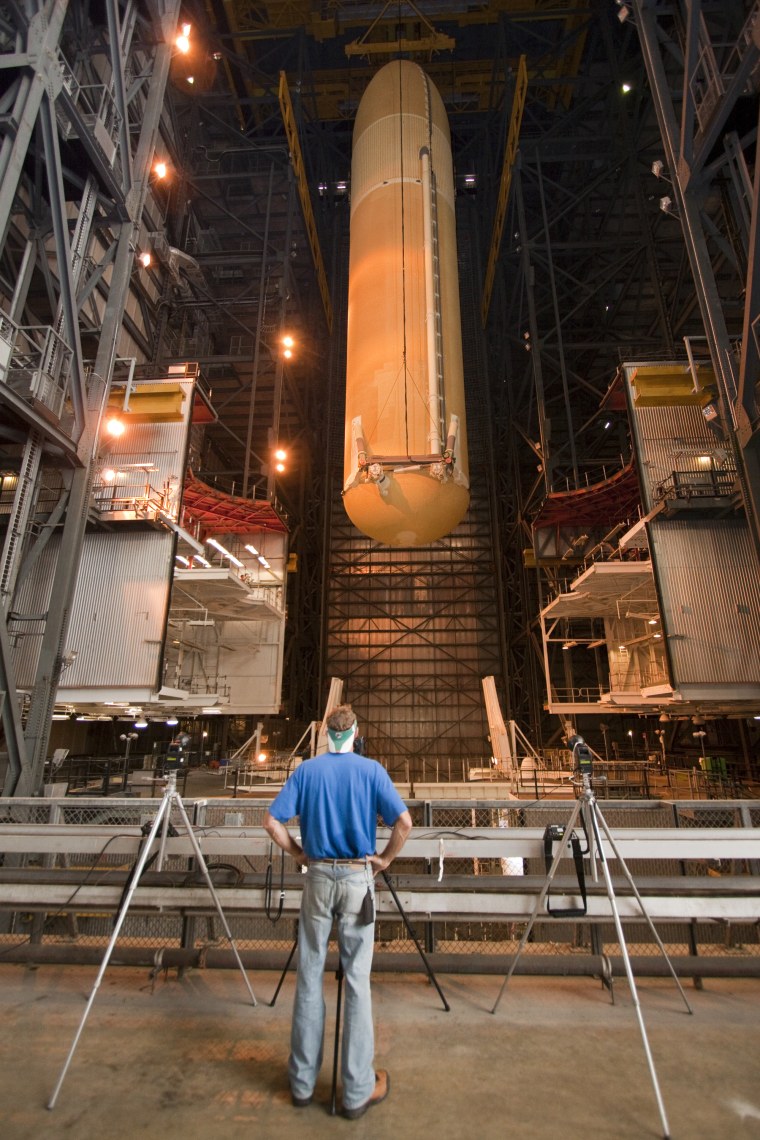NASA may not be going to the moon anytime soon, and its space shuttles are about to be retired, but it could conceivably increase the number of agency jobs under a new reorganization, NASA’s chief said Thursday.
NASA Administrator Charles Bolden said that because NASA has more money overall, it should have more jobs compared to the previous administration’s plans for a moon mission. But more of those jobs will be on research into airplanes and climate change. NASA also plans to spend billions of dollars more over the next five years on developing new rocket technology and helping private firms build their own ships to take people to the International Space Station.
“You have more money, and that would say you have more jobs,” Bolden said during a telephone press conference. But he said that the agency has not come up with any real figures on employment and that the more-jobs claim is based purely on correlation with spending.
During a teleconference, Bolden outlined how NASA would change under a new space plan that President Barack Obama unveiled in February with his 2011 budget.
That space plan kills a return-to-the-moon mission, dubbed “Apollo on steroids” that his predecessor proposed in 2004. To pay for that moon mission, known as the Constellation program, then-President George W. Bush announced the retirement of the space shuttles by the end of 2010.
Constellation: Dead or alive?
Space shuttles will still be mothballed within months, but now the moon mission is off the table as well. "In terms of NASA planning, Constellation as a program is dead," Bolden said.
Instead, the Obama administration will spend the money researching new rocket technology for general exploration, fostering commercial space industry, climate change science, and aeronautics. Some elements of the Constellation program, including the Orion crew exploration vehicle, may resurface as technology development projects or commercial ventures, Bolden said.
Rather than developing its own Ares 1 rocket to send astronauts to the International Space Station, NASA plans to rely on Russian transports and eventually U.S. commercial launch vehicles as well. One such rocket, SpaceX's Falcon 9, is due to make its first test flight next month from Cape Canaveral Air Force Station in Florida.
Slideshow 12 photos
Month in Space: January 2014
Bolden signaled that NASA will develop a new heavy-lift rocket for lofting large payloads into orbit and beyond. The space agency also will work on technologies for in-orbit refueling, radiation protection and precision landing — feats that need to be perfected in order to send humans to Mars.
"The ultimate goal has always been Mars," Bolden said.
The administrator said the "work plan" announced on Thursday was in part aimed at reassuring workers at the NASA centers that they had well-defined roles in the post-shuttle era. “We’re expanding the amount of programs we have so we can try to put people to do work who want to be involved in the space program,” Bolden said.
Preparing for Obama’s space vision
That will be a big issue next Thursday when President Obama goes to Kennedy Space Center in Florida, where people are concerned about losing their current jobs, to try to sell his space plan. Bolden said the president would give a "major space policy speech" at the invitation-only event and also meet privately with lawmakers.
Bolden said in NASA’s reorganization some areas that concentrate on the space shuttle will lose contractor jobs because the shuttle fleet is being retired this year.
Under the reorganization, Kennedy Space Center will be in charge of the new $6 billion program to encourage private companies to fly astronauts. The launch complex will get a $2.3 billion overhaul. Marshall Space Center in Huntsville, Ala., also figures to be hurt by the shuttle retirement, but it will be put in charge of trying to come up with the new heavy-lift launch vehicle. Johnson Space Center in Texas will be in charge of a new $6 billion technology development program.
All those plans are subject to approval by Congress.
In a statement, Sen. Bill Nelson, D-Fla., said the announcement that Kennedy Space Center will manage NASA's commercial crew development effort was "a step in the right direction."
"But there are still many miles to go," Nelson said.
This report includes information from The Associated Press' Seth Borenstein and msnbc.com's Alan Boyle.

